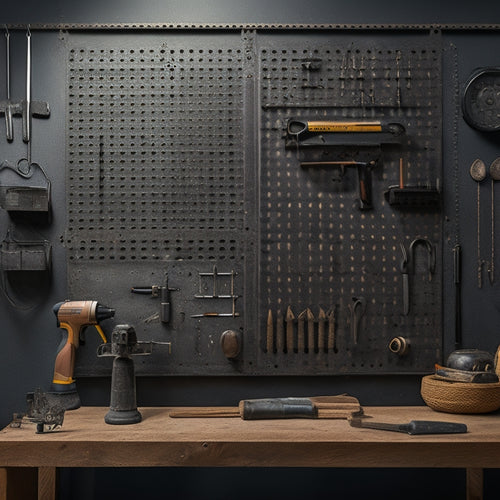
Revolutionize Production: Master Lean Techniques Now
Share
Embracing lean principles is a critical step towards revolutionizing production, as it enables organizations to reveal waste, optimize resource allocation, and drive operational excellence. By adopting lean strategies, companies can streamline processes, enhance quality control, and reduce production lead times. Successful implementation depends on strategic integration of lean tools and techniques, cultivating a culture of continuous improvement, and thorough employee training. As lean manufacturing becomes a cornerstone of production, exploring the principles and practices of lean can reveal the full potential of operational efficiency and customer satisfaction, and uncover the path to achieving unparalleled production performance.
Key Takeaways
• Embrace lean principles to streamline processes, eliminate waste, and optimize resource allocation for enhanced efficiency and productivity.
• Focus on customer-centricity, value identification, and waste elimination to guide operational excellence and continuous improvement.
• Implement lean practices successfully by integrating lean tools, cultivating a culture of continuous improvement, and providing thorough employee training.
• Adapt lean strategies across industries, including automotive, healthcare, and aerospace, to drive operational efficiency, waste reduction, and customer satisfaction.
• Overcome lean implementation hurdles by fostering employee engagement, clear communication, and stakeholder buy-in to create a culture of continuous improvement.
Unlocking the Power of Lean
By embracing the principles of lean manufacturing, organizations can harness significant improvements in efficiency, productivity, and customer satisfaction, ultimately leading to increased profitability and competitiveness in their respective markets.
The implementation of lean strategies enables companies to streamline processes, eliminate waste, and optimize resource allocation. This results in substantial lean benefits, including enhanced quality control, reduced production lead times, and improved supply chain management.
Principles of Lean Manufacturing
At the core of lean manufacturing lies a set of fundamental principles that guide organizations in their pursuit of operational excellence, emphasizing the elimination of waste, continuous improvement, and customer-centricity. These principles serve as a foundation for the successful implementation of lean techniques.
Value identification from the customer's perspective is vital, as it enables organizations to understand what adds value to their products or services. Flow creation is another essential principle, which involves streamlining production processes to eliminate waste and maximize efficiency.
Implementing Lean Practices Successfully
Effective implementation of lean practices hinges on an organization's ability to strategically integrate lean tools and techniques into its existing operations, fostering a culture of continuous improvement and accountability. This requires a deep understanding of lean principles and their application in various contexts.
To achieve successful implementation, organizations must invest in thorough lean training for employees, equipping them with the skills and knowledge necessary to drive change. A strong lean culture is essential, where employees are empowered to identify and address waste, and encouraged to contribute to ongoing improvement efforts.
Lean in Action Across Industries
Across various sectors, lean manufacturing has been successfully applied to drive operational efficiency, reduce waste, and enhance customer satisfaction, with numerous case studies demonstrating its versatility and effectiveness. The implementation of lean strategies has led to significant improvements in industry applications, showcasing its adaptability and value.
| Industry | Lean Strategies | Benefits |
|---|---|---|
| Automotive | Just-in-time production, Kanban systems | Reduced inventory, improved quality |
| Healthcare | Streamlined patient care, error-proofing | Enhanced patient satisfaction, reduced costs |
| Aerospace | Efficient supply chain management, value stream mapping | Improved delivery times, reduced waste |
Overcoming Lean Implementation Hurdles
Implementing lean manufacturing strategies can be a complex and challenging process, often hindered by organizational and cultural barriers that must be overcome to reap the benefits of this production philosophy. Effective change management is essential to address these hurdles, ensuring a smooth shift to lean practices.
Employee engagement is key, as it fosters a sense of ownership and encourages active participation in the transformation process. By empowering employees to identify areas for improvement and providing necessary training, organizations can overcome resistance to change and create a culture of continuous improvement.
Additionally, clear communication and stakeholder buy-in are necessary to sustain lean initiatives and drive long-term success.
Frequently Asked Questions
How Do I Measure the ROI of Lean Manufacturing Initiatives?
To measure the ROI of lean manufacturing initiatives, track cost savings from reduced waste, inventory, and lead times, and analyze financial metrics such as return on investment, payback period, and net present value to quantify the initiative's financial impact.
Can Lean Principles Be Applied to Service-Based Industries?
Can service-based industries truly remain competitive without embracing lean principles? By applying lean methodologies, service providers can enhance service quality, mitigate industry disruptions, and foster a culture of continuous improvement, ultimately driving growth and profitability.
What Role Does Technology Play in Lean Manufacturing Implementation?
Technology plays a pivotal role in lean manufacturing implementation, facilitating digital integration and automation platforms that optimize processes, enhance efficiency, and reduce waste, ultimately driving continuous improvement and competitiveness in production environments.
How Do I Ensure Employee Buy-In for Lean Culture Changes?
"Just as a conductor harmonizes disparate instruments, leaders must orchestrate employee buy-in for lean culture changes by breaking down Communication Barriers and leveraging Change Management strategies to foster a shared vision and collaborative ownership."
Are There Any Lean Certifications or Training Programs Available?
To advance Lean Competency, various Training Pathways are available, including certifications from organizations like the Lean Certification Alliance, offering specialized programs for professionals seeking to master Lean techniques and drive organizational excellence.
Related Posts
-

Heavy-Duty Pegboard Hooks for Industrial Use
You need heavy-duty pegboard hooks that can withstand the rigors of industrial use, providing a reliable and efficien...
-

Top Wrench Tool Box Sets for Every Mechanic
You're looking for high-quality wrench tool box sets that cater to your specific needs as a mechanic. From top-rated ...
-

What Are the Advantages of a Wooden Tool Box
You choose a wooden tool box, you're not only getting a reliable storage solution, but also a long list of benefits t...


